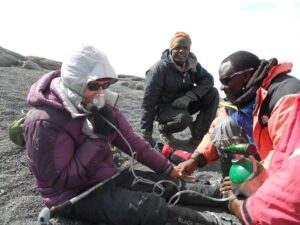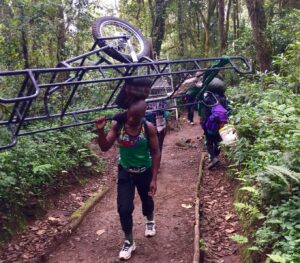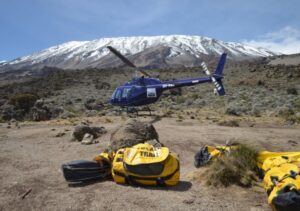Search & Rescue (SAR) operations on Mount Kilimanjaro are an essential aspect of ensuring the safety of climbers who may face emergencies while attempting to summit Africa’s highest peak. At African Delight Safaris, we understand that safety is a top priority when embarking on an adventure as challenging as climbing Mount Kilimanjaro. Our goal is to ensure that every climber has a safe and enjoyable experience on Africa’s highest peak.
Your safety is our priority. With well-organized rescue operations and preventive measures in place, we aim to make your Kilimanjaro adventure as safe and enjoyable as possible. Trust in our expertise and the professionalism of our teams as you take on this incredible journey.
The Tanzania National Parks Authority (TANAPA) is responsible for maintaining well-trained search & rescue teams at strategic points along the mountain, such as Horombo, Kibo, and Barafu camps. These teams are equipped to handle various emergencies, including altitude sickness and injuries, ensuring quick and effective responses when needed.
In the event of a serious emergency, helicopter rescues are available to evacuate climbers swiftly. Operated by private companies in partnership with TANAPA, these helicopters can reach different parts of the mountain quickly, especially in situations where ground-based rescues might be too slow or hazardous.
Our experienced guides and porters are your first line of defense when it comes to safety. Trained in basic first aid, they monitor your health throughout the trek. If you show signs of altitude sickness or any other serious condition, they will take immediate action, whether that means helping you descend or calling for a rescue.
Emergency shelters are available at various points on the mountain, providing protection in case of sudden weather changes or other emergencies. Our teams use reliable radio communication systems to coordinate rescue efforts, ensuring that help is always within reach. In areas with poor radio coverage, satellite phones are also used to maintain communication.
Altitude Sickness is the most common issue climbers face on Kilimanjaro. Our rescue teams are trained to recognize and treat conditions like high-altitude pulmonary edema (HAPE) and high-altitude cerebral edema (HACE). Oxygen and other medical treatments are available, and rapid evacuation can be arranged if necessary.
To minimize risks, all climbers must register with TANAPA before starting their trek. This allows for better monitoring and ensures that every climber is accounted for at each checkpoint. We strongly recommend that you follow the guidance of your guides, take your time to acclimatize, and adhere to the recommended routes to stay safe.
Rescue operations can be costly, especially those involving helicopter evacuations. We require all climbers to have travel insurance that covers high-altitude trekking and emergency evacuation. TANAPA fees for rescue operations are typically covered by your insurance policy.
The above listed measures ensure that African Delight Safaris guides and staff are prepared to keep our climbers safe and have the ability to treat climbers who become ill or injured.
At African Delight Safaris your health and well-being is our first priority.
No, they are not.
Many of our competitors will only tell you what you want to hear to make a sale.
While it is true that most operators employ guides with many years of experience on Mount Kilimanjaro, that does not necessarily mean they are actually trained on how to handle serious altitude sickness cases. And by the time you realize this, it may be too late.
Most Kilimanjaro operators do not have robust safety measures in place. They are simply not prepared for emergencies.
We present the above scenarios not to scare you, but to inform you. Because anyone who contemplates climbing Kilimanjaro must understand the risks. While the dangers associated with high altitude trekking can never be completely eliminated, they absolutely can be minimized by a competent, professional operator.
African Delight Safaris guides have the capability to conduct a mountain rescue in cases of emergency.
We carry bottled oxygen on all of our climbs as a precaution and additional safety measure.  The oxygen cannister is for use only in emergency situations. It is NOT used to assist clients who have not adequately acclimatized on their own to climb higher. The most immediate treatment for moderate and serious altitude sickness is descent.
The oxygen cannister is for use only in emergency situations. It is NOT used to assist clients who have not adequately acclimatized on their own to climb higher. The most immediate treatment for moderate and serious altitude sickness is descent.
With Kilimanjaro’s routes, it is always possible to descend, and descend quickly. Therefore, oxygen is used strictly to treat a stricken climber, when necessary, in conjunction with descent, to treat those with moderate and severe altitude sickness. We are aware that some operators market the use of supplementary personal oxygen systems as a means to eliminate the symptoms of AMS. To administer oxygen in this manner and for this purpose is dangerous because it is a temporary treatment of altitude sickness. Upon the cessation of the use of oxygen, the client will be at an even higher altitude without proper acclimatization.
Large, one-wheeled rescue stretchers are found on Mount Kilimanjaro, but they are only available on certain routes of the park. That means that if a climber is unable to walk due to severe altitude sickness or a leg injury that compromises mobility, getting that climber down the mountain could pose difficult challenges for Kilimanjaro operators when these stretchers aren’t nearby. Usually, it means assisting the injured climber by carrying him or her on one’s back.
Mount Kilimanjaro, but they are only available on certain routes of the park. That means that if a climber is unable to walk due to severe altitude sickness or a leg injury that compromises mobility, getting that climber down the mountain could pose difficult challenges for Kilimanjaro operators when these stretchers aren’t nearby. Usually, it means assisting the injured climber by carrying him or her on one’s back.
Our portable stretchers are compact, strong and lightweight. The device can be used to evacuate an injured climber quickly off the mountain. To use, the subject is secured to the stretcher using straps. Then porters hold on to the hand grips to usher the climber to safety.
We are partnered with Kili Med Air, a helicopter operation which conducts rescue services on Kilimanjaro. Once a distress call is received, rescue procedures are activated within minutes. Expert pilots, highly trained rescue doctors and emergency flight technicians are exceptionally qualified and prepared for all emergencies on the mountain.
Once a distress call is received, rescue procedures are activated within minutes. Expert pilots, highly trained rescue doctors and emergency flight technicians are exceptionally qualified and prepared for all emergencies on the mountain.
Note that this service is only available to clients who have the required travel insurance. Special travel insurance is mandatory to participate in our trips. Clients must be covered to trek at high altitude up to 6,000 meters to qualify for helicopter rescue. Your travel insurance will be verified by our staff before the trek.
We’ll help you customize your own itinerary for a once in a lifetime adventure in Tanzania.